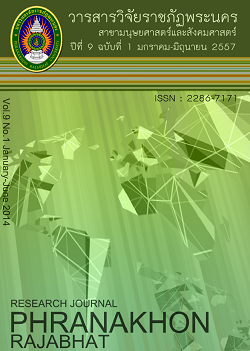การพัฒนารูปแบบรายวิชาคู่ขนานในรายวิชาภาษาอังกฤษเพื่อการโรงแรม 1 กับวิชาหลักการโรงแรม มหาวิทยาลัยราชภัฏพระนคร
Main Article Content
Abstract
การวิจัยครั้งนี้ มีวัตถุประสงค์เพื่อพัฒนาและประเมินผลการใช้รูปแบบรายวิชา คู่ขนานในรายวิชาภาษาอังกฤษเพื่อการโรงแรม 1 กับรายวิชาหลักการโรงแรม ประชากรที่ ใช้ในการทดลอง เป็นนักศึกษาระดับปริญญาตรี สาขาวิชาอุตสาหกรรมการท่องเที่ยว มหาวิทยาลัยราชภัฎพระนคร ภาคเรียนที่ 1 ประจำปีการศึกษา 2555 ที่ลงทะเบียนเรียนใน รายวิชาภาษาอังกฤษเพื่อการโรงแรม 1 กับรายวิชาหลักการโรงแรม จำนวน 30 คน เครื่องมือที่ใช้ในการวิจัย ได้แก่ แผนการเรียนรู้ สื่อการเรียนรู้ในแต่ละหน่วยการเรียนรู้ เอกสารประกอบการเรียนการสอน แบบประเมินผลสัมฤทธิ์ทางการเรียน ชิ้นงานที่ได้รับ มอบหมายร่วมกันจากทั้งสองรายวิชา แบบสอบถามความคิดเห็นของผู้เรียนที่มีต่อการสอน การวิเคราะห์ข้อมูลใช้ค่าร้อยละและค่าเฉลี่ย
ผลจากการจัดการเรียนการสอนรูปแบบรายวิชาคู่ขนานในรายวิชาภาษาอังกฤษ เพื่อการโรงแรม 1 กับวิชาหลักการโรงแรม พบว่า นักศึกษามีคะแนนผลสัมฤทธิ์ทางการ เรียน ค่าเฉลี่ยร้อยละ 77.20
ผลการประเมินชิ้นงานนักศึกษาพบว่า นักศึกษาได้คะแนนจากทั้งสองรายวิชา (ในแง่ของทักษะความรู้ของรายวิชาภาษาอังกฤษเพื่อการโรงแรม 1) ทั้ง 4 ชิ้นงาน มี คะแนนเฉลี่ยเท่ากับ 81.68 คิดเป็นร้อยละ 81.35 ค่าเบี่ยงเบนมาตรฐานเท่ากับ 0.34 ทั้งนี้พบว่า นักศึกษามีพัฒนาการในการทำงานแต่ละชิ้นงานเพิ่มมากขึ้น พัฒนาการที่ เปลี่ยนแปลงอย่างชัดเจน ได้แก่ ทักษะการเขียนและการสื่อสารภาษาอังกฤษ ทักษะการ ทำงานร่วมกับผู้อื่น และพบว่านักศึกษามีความเข้าใจเนื้อหาที่เรียนได้เร็วมากยิ่งขึ้น และผล จากการสอบถามความคิดเห็นจากแบบสอบถามของนักศึกษาที่มีต่อการสอนของวิชา คู่ขนานในภาพรวม พบว่า นักศึกษามีความคิดเห็นต่อการสอนของวิชาคู่ขนาน รายวิชา ภาษาอังกฤษเพื่อการโรงแรม 1 และรายวิชาหลักการโรงแรม ในภาพรวมอยู่ในระดับมาก ทั้งสองรายวิชา มีค่าเฉลี่ยเท่ากับ 3.94 เมื่อพิจารณาเป็นรายด้าน พบว่า ด้านที่มีค่าเฉลี่ย สูงสุดสามอันดับแรกคือ ด้านผู้สอน มีค่าเฉลี่ยเท่ากับ 4.11 รองลงมาด้านการวัดและ ประเมินผล มีค่าเฉลี่ยเท่ากับ 4.01 และด้านประโยชน์และการประยุกต์ใช้มีค่าเฉลี่ยเท่ากับ 4.00 ตามลำดับ
SEQUENCED COURSES MODEL DEVELOPMENT OF ENGLISH FOR HOTEL 1 AND HOTEL PRINCIPLES AT PHRANAKHON RAJABHAT UNIVERSITY
The research aims to develop and evaluate the effectiveness of the course based on the sequenced model in the subjects English for Hotel I and Hotel Principles. The population is the 30 undergraduate students majoring in Tourism Industry, Phranakhon Rajabhat University. They enrolled the two mentioned courses in the first semester of 2012 academic year. The instruments used in the research were lesson plans, learning materials in each learning unit, teachings and learning materials, achievement evaluation forms, integrated tasks or assignments in both subjects, as well as questionnaires on the instruction the were analyzed by percentages and means.
The findings of the instruction, the employing the course based on sequenced model in the subject English for Hotel 1 and Hotel Principles indicated that the means of their learning achievement scores are 77.20%.
In terms of the skill and knowledge learned in the subject English for Hotel 1, it was found that the students’ means scores of the four integrated assignments of two subjects were 81.68 or 81.35 % (standard deviation=0.34). It was found that the students obviously improved their abilities and skills in each task such as English writing and communicative skills and teamwork. In addition, the students understand the content. According to the findings of the questionnaire regarding the students' opinions towards the integrated models of two subjects, it was found that in general the students were satisfied with this type of instruction a high level; that is, the means were 3.94. When considering each factor, it was found that the highest means were the lecturers (4.11), measurement and evaluation (4.01), and its benefit and application (4.00) respectively.
Article Details
Each publish articles were copyright by Phranakorn Rajabhat University
Any contents which appeared in each articles in the journal were authors personal opinion. It did not relate to Phranakorn Rajabhat University and other instructors in the university. Each authors would take responsibility on their articles. If there are any mistake, the authors will take responsibility themselves


